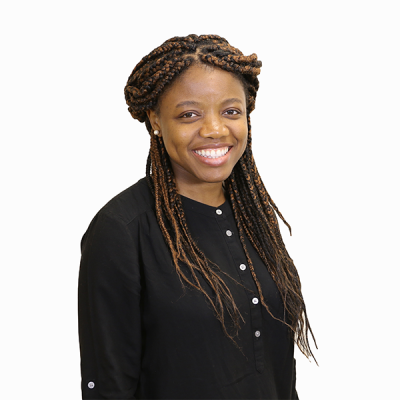Faculty Fellow Uses Digital Data to Advance Public Health Practices
BY: ALEX JOHNSON
For many people, walking just one block around their town or city will result in them passing hospitals, pharmacies, and grocery stores. These things exist as a part of a public health network for local communities, but access is not always equal to everyone. Elaine Nsoesie, a Faculty Fellow at the Hariri Institute, devotes her time and energy to tracking and understanding the health of diverse communities to inform policies that enable a more equitable future.
Nsoesie was not a straight A student during her undergraduate career, but she found her calling in research. “I wasn’t very good at exams,” Nsoesie said. “But research gave me time to think deeply about problems and it gave me time to write, which I really enjoyed.” There were many individuals who helped cultivate her interest in research. Rajeshwari Sundaram, a Senior Investigator at the National Institutes of Health, was one of those mentors who was not interested in her GPA but focused instead on her passion and drive to learn.
Having guides to help her harness her research skills and understand how research can improve people’s lives really had an impact on Nsoesie, and she tries to pay her mentorship experience forward. Now that she is a teacher and mentor herself at Boston University, Nsoesie works hard to provide her students with research experiences. She recently taught a class for graduate students, Applications of Machine Learning in Global Health, and coached them through research projects that the students are currently finishing up for publication in public health journals. “It was a lot of work, but the students all really enjoyed it,” she says. “The students felt like they were learning more, and learning how to apply what they were learning in class to real issues.” This is what Nsoesie hopes to accomplish as an Assistant Professor in the School of Public Health – to spark a love for research and an interest in using computational methods to solve real-world problems.
Nsoesie’s research centers around using digital data, including data from social media and mobile phones, to better understand health in communities. Studying communities online allows Nsoesie to reveal new indicators of health. Using social media data is also usually faster and cheaper than conducting in-person surveys. For example, one of the projects from the aforementioned class studied how people talked about diet and alcohol online during the pandemic. Results from this project could inform public health policies and practices.
Some of Nsoesie’s projects center on Africa. Born in Cameroon herself, she always wanted to focus her research efforts on Africa. “Culture plays a role in how we perceive health and what health information people seek and share on online platforms,” said Nsoesie. For example, in a study focused on influenza-like illness in Cameroon, Nsoesie and colleagues found that common online search terms used for influenza-like illness were different in the United States then they were in Cameroon. People in Cameroon were more likely to search for diseases that are more prevalent, such as Malaria, and home remedies for treating influenza-like illness.
Nsoesie strives to get more researchers working on data science projects in Africa to help inform policy making in an affordable and sustainable way. She sometimes assists a Kenya-based nonprofit called Data Science Africa that organizes and hosts workshops to help people develop practical skills, like coding, and an understanding of how machine learning or other state of the art data science methods can be applied in Africa. Nsoesie is on the organizational committee for this program, and is involved in planning, executing, and contributing to their lectures and workshops.
One of Nsoesie’s main goals is to use data science to advance health equity, or the opportunity for every person to be as healthy as possible regardless of their background. She recently became a co-lead for a National Institutes of Health’s Artificial Intelligence/Machine Learning Consortium to Advance Health Equity and Researcher Diversity (AIM-AHEAD) Program. The program focuses on using artificial intelligence to advance health equity and involves a diverse community of over 100 people working to build a consortium of organizations and institutions that want to create a more inclusive basis for artificial intelligence, and are serving populations affected by health disparities. “The program is very collaborative, and we’re excited to see the impact in communities that are underrepresented in biomedical data science,” said Nsoesie. She also works as a faculty lead for the Racial Data Tracker project with the Center for Antiracist Research, which is focused on gathering, visualizing and studying racial data to highlight racial inequity across the United States.
Nsoesie actively works to build and strengthen the connections between health and community. Her holistic and forward-thinking approach to health data honors the communities she studies, and the diverse insights from her research can enable policy changes that place equity at the forefront. “Starting with a focus on equity makes a lot of difference,” Nsoesie says. “From there you can design studies that take into account different individuals so you can better understand what they need.”
To learn more about the Hariri Institute’s transformational research, click here to sign up for our newsletter.
